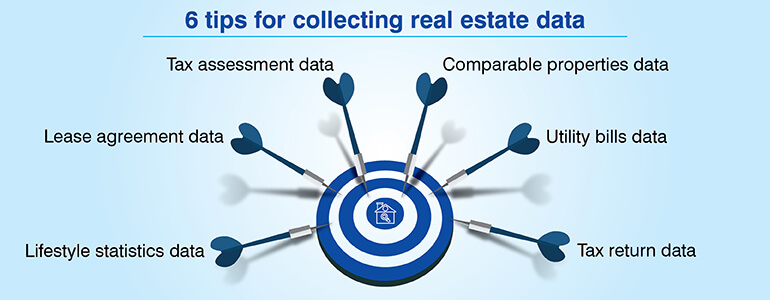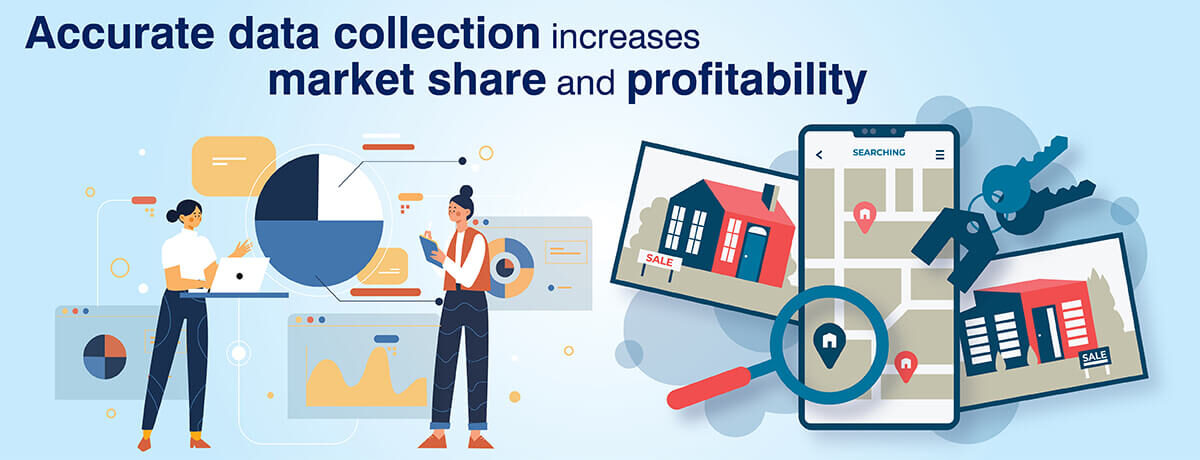Comprehensive data has replaced experimental hunches to become the key driver of business strategies for real estate marketplaces. It empowers them to capitalize on new markets, grow profitably, and maintain a competitive advantage.
Recent advancements in technology and real estate data collection tools have led to a demand spike for focused but detailed property information. Real estate marketplaces are scrambling to make sense of everything, right from abrupt changes to the latest trends. They have to factor in angles ranging from COVID-specific housing policies to the effects of lockdowns on property viewings. This has led to a 300% increase in the number of businesses offering technology-based collection, validation, and enrichment of property data for real estate marketplaces.
We live in an era where data is available everywhere. However, what we prioritize for collection determines the actual results of our data management efforts. Therefore, many real estate marketplaces now rely on specialized data providers to collect real estate data.
In this article, we recommend six data collection tips to help you optimize your real estate data.
6 tips for collecting real estate data
Homebuyers and other customers rely on leading property listing sites for guidance on purchase, sale, and investment decisions. Hence, it is extremely important for listing sites to collect the right data for users. And here are your tips to do that.

1. Check and collect the latest lease data
Lease data is a primary requirement for marketplaces. Most MLS sites need help in collecting information about current tenants and leases. They need it to help their customers with the information required to manage and track lease agreements and tenants.
Vital information like duration of the lease, chances of tenants renewing the lease, and costs are of first importance. These provide insights into a property’s potential income and risks involved – if any. Here are the lease data fields that matter the most:
- Names of occupants and tenants
- Description of the property on rent
- The tenancy term
- The rent amount
- Security deposits and fees
- Maintenance and repair terms
- Contact information
Data collection experts were roped in to extract relevant property information from 1350+ Multi Listing Sites and appraisers every month. A leading real estate property dealer based in the US used it to enhance their property database to engage leads, prospects, and existing clients.
2. Get information on the most recent tax assessment
Next comes the recent tax assessment of residential, commercial, and mixed-use properties. The value of income from property can differ from year to year. And it is crucial to collect the most recent tax assessment information from relevant county websites. Accurate tax assessment data enables marketplaces to help buyers have a clear idea about a property’s value and tax liabilities.
- SWIS (State-Wide Information System) number: A six-digit unique identifier number. The first two digits define the county, the second two city/town, and the last two identify the village.
- Percentage of market value fixed for assessment: All properties in a municipality are usually assessed at the same percentage of market value. This needs to be stated, and the deviation, if any.
- Valuation date: Property is assessed based on what its market value would have been on the given taxable status date.
- Taxable status date: The ownership and physical condition of the property as on the date of assessment
- Tax map parcel number: The number aka Section-Block-Lot or SBL used to match the number on the tax bill needed to apply for exemptions and assessment reviews.
Various other related data fields include property location and class, land assessment, total assessment, full market value, exemptions, tax descriptions, and similar features. Keeping a constant tab on the changes to the tax data helps you provide real estate trends and property value estimates to your valued customers.
3. Collect data about comparable properties
Renters, buyers, sellers, and investors believe that real estate marketplaces like Zillow, realtor.com, trulia.com, Foreclosure.com, apartments.com, etc. are the best sources for comparable properties. This is because the property information these marketplaces hold is accurate, comprehensive, and near real-time.
Customers can learn details of the area, interpret comparables in tune with area trends, home value appreciation, and price per square foot. It also gives them an idea of the property’s value and how it compares to similar properties in terms of size, amenities, and location. Here are the comparable property fields to be collected:
- Location: Enable search to a quarter to half mile from the prospect’s desired location
- Timeframe: Include properties that are up for sale or rent within 30-60 days
- Size: Specific size configurations of the property
- Bedrooms/bathrooms: Include the number of bedrooms, bathrooms, and lounges of comparable properties
- Condition of property: Include information on recent renovations and updated interiors
- Age of property: Properties constructed around the same time to give the most accurate comparables
- Nearby features: Walkability, shopping malls, waterfronts, views, public transportation, and schools
- Price per square foot: Customers use price per square foot to identify comparables. Divide the sale price of a property by its square footage and showcase that number.
Collect data from every source that offers information about comparable properties in the area. This will help your marketplace determine if the property you want to put on your site will entice customers.
4. Data/information on utility bills
Prospective customers visiting your real estate marketplace will want to check data on utility bills to determine monthly expenses. While collecting information on utility bills, verify cases where some tenants pay utility bills separately, while for others, it is a part of the lease agreement. Collect all utility expense information considered standard in households.
- Electricity and gas
- Water
- Sewage and garbage disposal
- Internet and cable TV
- Phone services
In one of the projects, utility bill information from gas, electric, and water company websites was collected. It was validated and verified to ensure that it corresponded to the details shared by sellers. The data was further used to support the property information on one of the leading real estate marketplaces of the USA.
5. Check the seller’s tax return sections
Customers looking to buy properties for investment purposes are more than interested in having some or more details on the section of the tax return. They need to know if the seller has been taking any tax deductions for the property. Collecting information about deductions for properties from the “Schedule E” section of the tax returns is also a good idea. Ultimately, it helps your buyers verify the accuracy of a seller’s claims about the property.
6. Collect property data with lifestyle statistics
Many sellers, buyers, and investors these days belong to Gen Z. Marketplaces must put in extra effort when catering to their property data requirements. Including information on amenities is crucial for attracting next-generation buyers and sellers. Data that clients consider important in this respect include:
- Individual property features
- Details of storage space
- Dishwashers, blenders, refrigerators, air conditioners
- High-speed Wi-Fi connection
- In-unit washing and drying machines
- Smart home technologies like security alarms and remote locking
- Community amenities and facilities
- Commercial parcel lockers for holding valuables
- Health facilities like gyms and swimming pools
- Parking space for vehicles
- Pet-friendly amenities like pet doors and pet zones
- Security for the area
Collecting accurate information about lifestyle amenities is vital. Take measures to ensure accurate information by verifying and validating sources and the freshness of the data. Keeping your marketplace data organized will make it convenient for you to enable your customers to refer to and spot patterns more easily.
Future of real estate data collection
Real estate is one of those industries that naturally generates lots of highly contextual data and, when used effectively, it can be the building blocks for a real estate marketplace. Today, artificial intelligence is gathering data in real estate. Machine learning has been paving the path for the modernization of real estate marketplaces to make both property buyers and sellers meet and settle for the right price. Robotics, augmented/virtual reality sensor technology, internet of things, building information modeling systems, and other disruptive technologies are poised to transform the real estate industry.
Real estate portal that understands customer requirements and match them with a listing can build a business that scales insights and information to stay ahead of the curve. Real estate marketplaces can lead the way by implementing effective strategies around embracing technology, digitalizing buildings, and infrastructure, and analyzing user behavior to meet the demands of the future.
Conclusion
For decades, the real estate industry has struggled hard to attract data professionals with the desired skills. However, the data industry has a wide variety of challenges that professionals like to experience. Therefore, in-house teams are not always the best solutions for real estate marketplaces, and they must hire real estate data collection services. Therefore, real estate marketplaces need to be certain of information collection priorities. Because only then they can properly channel resources into data collection for highest impact.
Enhance the quality and scope of your real estate marketplace.
Contact our experts to collect, validate, update and enrich your property data.
Get started today »




